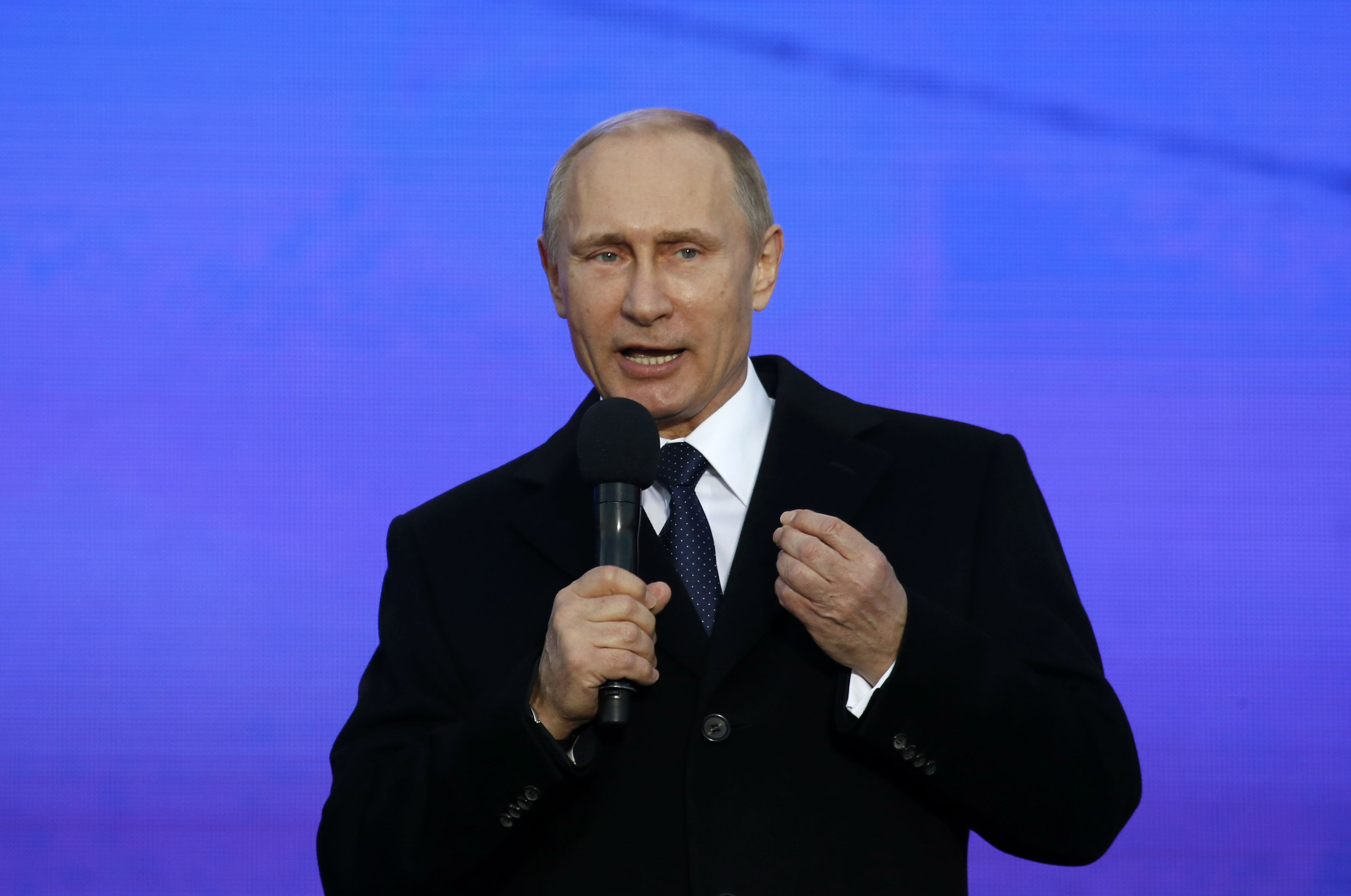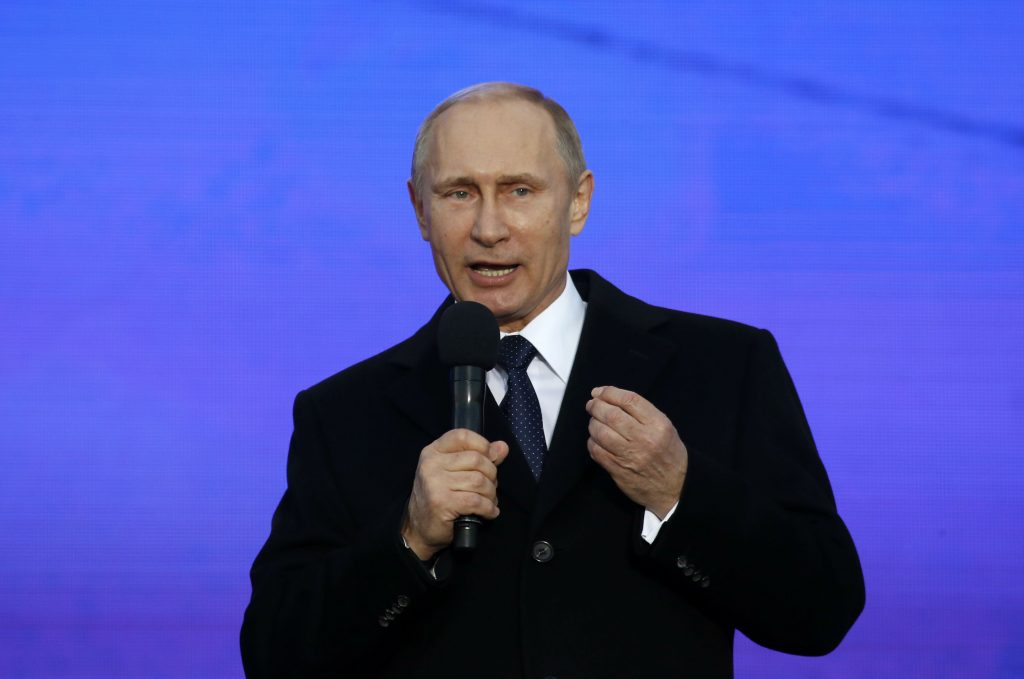 On April 5, Russian President Vladimir Putin suddenly announced creation of a National Guard, of up to 400,000 personnel, to control drug trafficking and terrorism.
On April 5, Russian President Vladimir Putin suddenly announced creation of a National Guard, of up to 400,000 personnel, to control drug trafficking and terrorism.
But former Pentagon adviser Evelyn Farkas has a different take: “I see this as riot control.”
Putin is distracting attention from bad economic news, due to sanctions, she said. “This has to do with his nervousness about maintaining control and having a ready force in case he has large demonstrations in light of the poor economic conditions.”
Russia’s parliamentary elections are in September, and the economy is shrinking due to sanctions over Ukraine and low oil prices.
Global intelligence forecaster Stratfor agreed with her and bluntly surmised that Putin’s new Guard is about preventing a coup.
Farkas has had a distinguished career, most recently serving as deputy assistant secretary of defense for Russia, Ukraine, and Eurasia for five years. She played a major role in securing $244 million in military support for Ukraine but left last fall after the administration would not draw a tougher line against the Kremlin by providing lethal defensive weapons to Ukraine and other measures.
In an interview on April 6, Farkas said timidity encourages Putin’s boldness, allowing him to undermine international law as well as nuclear nonproliferation efforts.
By invading Ukraine, Putin ignored the 1994 Budapest Memorandum signed after it agreed to surrender its nuclear weapons.
“Ukraine gave up its weapons in return for a guarantee of border security from three signators: The United States, Russia, and Britain,” she said. “It’s a travesty.”
“Sanctions were imposed on Russia in part for the violation of the Budapest Memorandum. However, we ought to be figuring how to get Russia to pay more. Along these lines, it is morally and politically incumbent to provide lethal defensive weapons to Ukraine.”
Farkas said the negative implications are ongoing.
“We broke our political word, not only letting down Ukraine, but people look at it as a trick. Ukraine gave up nuclear weapons in exchange for a guarantee which was not kept and, even worse, one of the signators was the violator.”
“What do we do next time we’re faced with situation where a country is willing to give up nuclear weapons but would like a guarantee? Do they ask for a treaty instead of a guarantee, or do they just refuse to give up their nuclear weapons? Why would North Korea give up nuclear weapons?”
She said she and others were unable to convince the administration to provide lethal defensive weapons to Ukraine.
“Frankly, it was the desire to keep the military situation from escalating, despite the fact that defensive weapons would not change the military balance sufficiently for Russians to take additional military action,” she said.
“Some people believed that providing weapons would exploit the situation. My view is the opposite because lethal defensive weapons would have deterred Russia. They would have been unhappy and blustery, but we didn’t believe they would undertake rash military action in response to the appearance of [US built anti-tank weapons] Javelins on the battlefield.”
Farkas believes that even though Russia continues to weaken, the United States must initiate more measures to contain Putin. These include ending all military cooperation with the Kremlin and increasing assistance to Ukraine and other Russian neighbors.
She also believes that the West must counteract the massive Russian propaganda effort by establishing a dedicated team like the new State Department Global Engagement Center, created to counter radical Islamic terrorists’ messages.
“More must be done to deter Russia from further military action,” she said.
Russia violated the principles of the NATO-Russia Framework Agreement by invading Georgia and Ukraine. This means that NATO is now free to position substantial military forces in the eastern part of NATO territory, and should consider placing a battalion or more in Poland.
Pressure on Ukraine to strengthen its resolve and eradicate corruption must continue, she added.
“[President Petro] Poroshenko is under pressure himself because of the Panama Papers and may not feel he has to do that much. There’s an uptick in military activities along the line of control and we are entering the time of year when [the Russians] could get tempted to do something,” she said.
Her concern about Putin goes beyond the region.
“The threat from Putin is that he seeks to inaugurate a new international order that permits human rights abuses by despotic leaders and invasion, occupation and political subversion of sovereign states,” she said.
Putin’s brief foray into Syria did not help the coalition eradicate ISIS, but helped Syrian President Bashar al-Assad consolidate power by destroying his rivals, she said.
“Putin uses all means to obtain influence and so he’s used bribery, funding of right-wing political parties, funding of NGOs, funding the left wing too and using his near monopoly of oil and gas to put pressure on countries. He’s not finished.”
Diane Francis is a Senior Fellow at the Atlantic Council’s Dinu Patriciu Eurasia Center, Editor at Large with the National Post in Canada, a Distinguished Professor at Ryerson University’s Ted Rogers School of Management, and author of ten books.
Image: Russian President Vladimir Putin delivers a speech during a festive concert marking the first anniversary of the Crimean treaty signing in central Moscow, March 18, 2015. Russia's flag is flying across Crimea on the anniversary of what President Vladimir Putin calls the region's historic "return home" after Russian troops seized control of it from Ukraine and the people backed annexation in a referendum. REUTERS/Maxim Zmeyev
